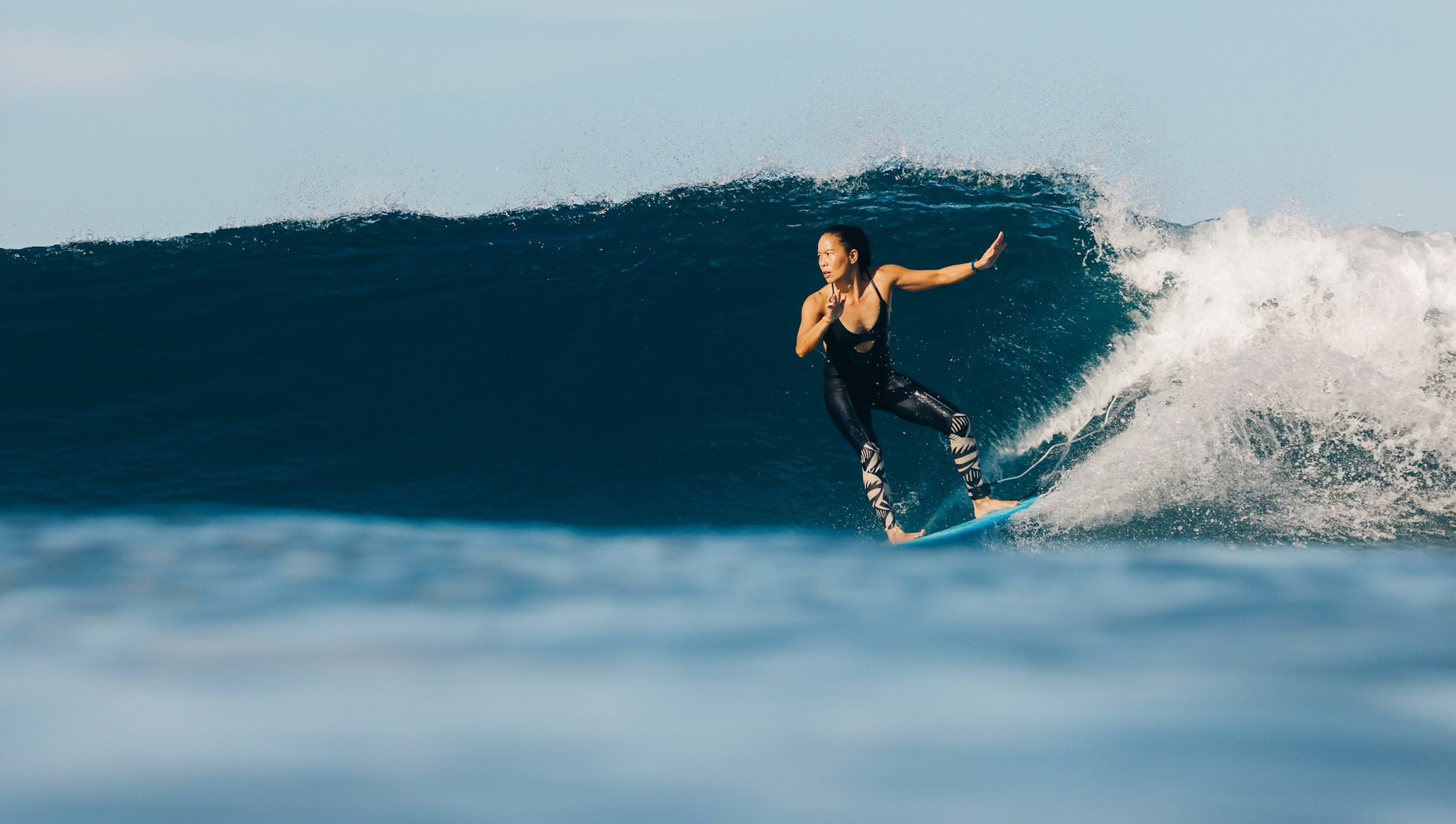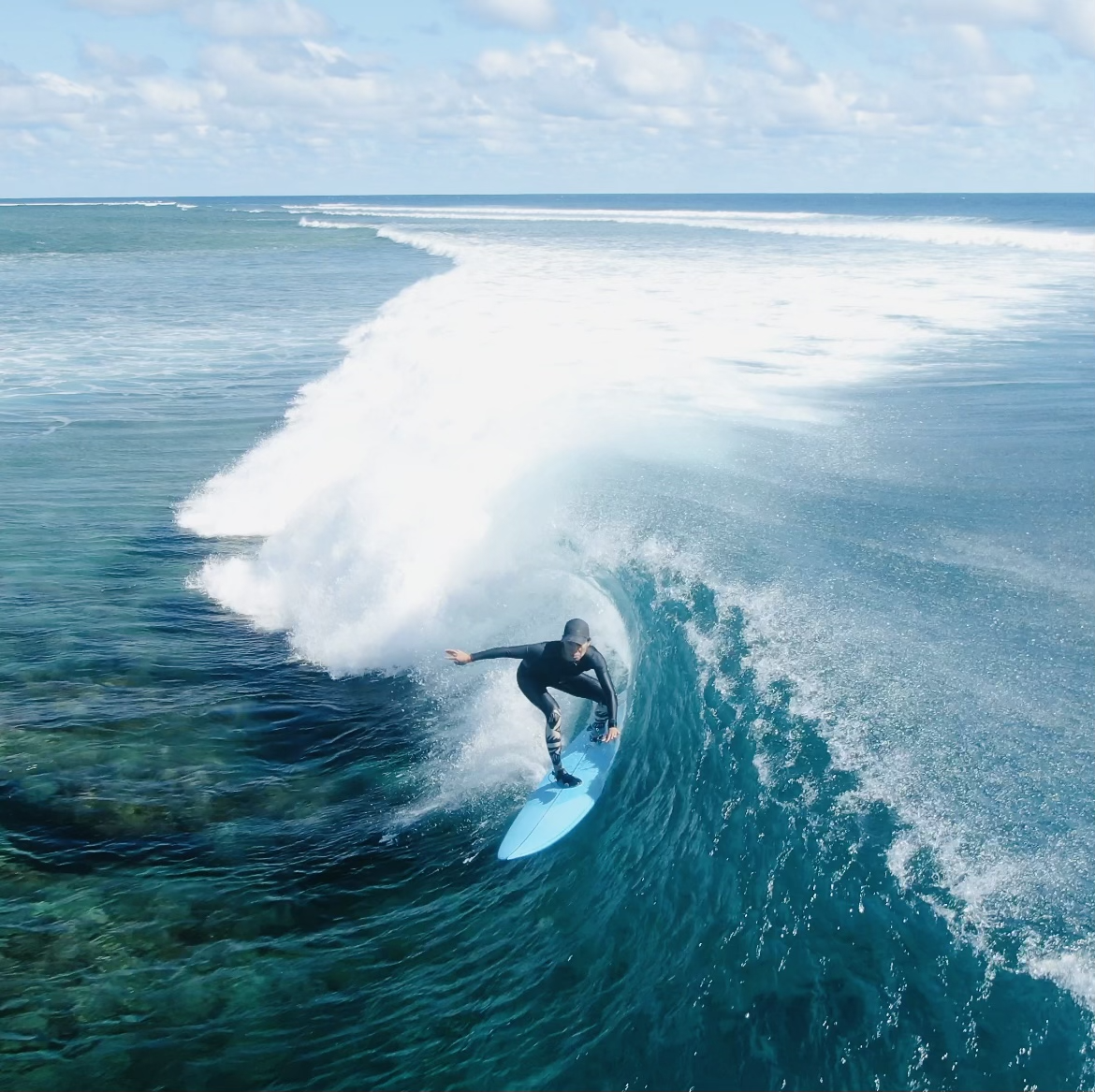
BONNIE, 47 | BERKELEY, CA
I am always learning something, and humbled and elevated, and elated—and then humbled and elevated ...
I’m from New York. I never thought I was going to leave New York. And I didn't actually want to move to California. But I think after living here for a few years, I was more open to the idea of California. And surfing came along at a time in which I wanted to fall in love with California — it was a way for me to do that.
I didn't start surfing until right before I got pregnant with my older son. I was 29 or 30, and it was not something where I’d had a lifetime of wanting to do it.
I'm a way better surfer now than I was then! But I say that with the caveat that every day is like a constantly renewing thing out there as a surfer. I am always learning something, and being humbled and elevated and elated — and then humbled and elevated and elated all over again.
Water in general, has always played a particular role in my life. When I wrote Why We Swim, I was starting to think about my relationship with the ocean, knowing that it did something that was both a calming thing — a balm in my life that I could get every morning if I wanted to — and also something that fills my cup. It refills something really essential to me, and makes me more me.
Like a lot of people at this age, I'm managing both my parents and my kids. My mom has had a lot of serious health challenges in the last couple of years, and she lives in New York. My parents are divorced. My dad lives in China, so I rarely see him. My husband's parents are also divorced; his dad is in Philadelphia, and his mom is up here in Sonoma. Both remarried, and his father has been very ill. And then we have two kids who are awesome, and we want to be present for them. And we also have our individual careers and lives. I think, at this stage of life, you are the grown-up in many different facets of your life. Whereas before you were the kid for your parents, now maybe you're more like a peer-caregiver-child.
So surfing is in some way a resetting to this child-like, wide-eyed wonder part of yourself, and I think that is so valuable at this particular stage of life.
Every time I get in the ocean, it's like a reset, and I can’t be thinking and worrying about that stuff in that moment because from the moment I paddle out, I’m just taking it all in — noticing the water and what it looks like, and what it feels like, and the air, and looking at the gorgeous colors in the sky. Or some dolphins come up to you, or a whale is breaching right there, or you just got this fucking awesome wave, and then you have the shit-eating grin, and everyone's cheering for you, and you're cheering for your friends, and you're calling people into waves.
Even if you're in a quieter, more pensive mood, the ocean absorbs that, too. So if you're feeling heavy and maybe you're not feeling as playful, sometimes you're out there and you want to be quiet, and you paddle away from people, and you go find your own spot. And that's meditative, and that's restorative in its own way.
Surfing has allowed me to connect to some amazing people, and some amazing women. I wrote a magazine story about Big Wave women preparing for a season at Maverick’s. And that led to a children’s book about Sarah Gerhardt. We just had an event last week at Traveler Pacifica. Sarah came up from Santa Cruz, where she lives. She's a professor of chemistry. She's amazing. And so we had this adorable kids’ story-hour event, and these kids were so cute, and some were actually, like, “This is my favorite book!”
I love that there are so many surfers of different ages, and that you can make that connection across the decades to them. I know a lot of older surfers. I know a lot of surfers my own age. I know a lot of surfers much younger than I am, and I love that surfing is the place where we get this cross-generational interaction.
Surfing has taken me to places I never thought I would be able to go. Like Fiji. It was a wonderful gift to get to go there. And all week, everyone was talking about this break called Restaurants. It’s famously shallow on the inside, and so many people have gotten their faces mauled on the reef, and they come out and they have to get airlifted to wherever to get their faces fixed.
And I just thought, ‘That is horrible and terrifying’ … but also it's this long, long, long left, and I'm goofy foot, and so I went out. And all week it had not been working. And then, on the last day, the last morning, I was with someone, and they were like, ‘Let's just try it.’ And this person knows what they're talking about. And there were these crazy offshore winds, just blowing insane. And the tide was just starting to rise enough so that it would work. And it was so shitty for a while that almost no one was out. So I was out there pretty much by myself, and there was one lifeguard from the island who was on a longboard, and we were waving at each other.
And then suddenly it just turns on. Not just that the wave was coming perfectly clean, but everything just clicked for me, and I could see the wave coming and what I needed to do. And I could paddle and get up right away and pump and just go.
Restaurants is called that because there’s a restaurant right there on Tavarua Island. And if you’re in the restaurant, you're watching people surf this wave, and it's very daunting because people are watching you.
And on this morning I looked at the restaurant and it was dark, you couldn’t see anything. I thought, ‘Oh, no one's watching. I'm the only one out here, you know, with my friend who’s telling me what to do.’
And then I catch a couple more and then they send a drone up! When you go there there’s a guy who is hired to film and take pictures for the whole week for everyone who's staying there. And this guy films and takes pictures of professional surfers, world-class surfers, and I'm just like, a nobody, a person who doesn't know what she's doing, but is having the time of her life, the day of her life, the session of her life.
So when I see the drone go up, I realize, ‘Oh, they're watching.’
So I'm thinking, ‘I better not fuck this up!’
And then I catch this wave, and I take off, and the drone is swooping down, and I’m thinking, ‘OK, don't eat it right here.’ It was like, 30 seconds, and you're racing it all the way to the reef. And everything just felt right. And I'm just like, ‘Hell yeah!’ And I'm making all the turns, and because the water is so clear, you see the reef right under you and it is literally knee deep. So on the last pump up, I kind of got hung up on the lip, and I was just like, ‘I gotta bail out because I can't get pushed into the reef.’
And I'm so happy, and a few other surfers have just shown up, so I call it. And then I went back and got dropped off at the island, and when I walked into the restaurant, everyone started clapping and hollering.
And that is still probably the wave of my life.
I think when we get to be grown-ups, there are fewer and fewer opportunities to make new friends, try new things, put yourself in a place where you're really learning and vulnerable, or worried about looking dumb, or failing, or kooking out, or whatever. And to be honest, this happens to me all the time. I think this is what I find so interesting about surfing: for the most part, no matter how good you get, no matter how great you feel at the end of one session, literally the very next session, or even the very next wave, you could just eat it and just be so humbled.
I don't think that most people seek out that feeling actively in life, meaning, ‘I want to go do a thing over and over again in which I fail.’
And I think what's great about surfing is that you are constantly getting better at it across those kinds of days that don't feel great.


